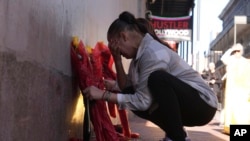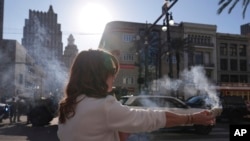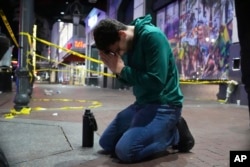Less than 48 hours after Wednesday morning's attack on their city's iconic French Quarter neighborhood, New Orleanians are trying to find a way forward.
It's something they have had to do countless times in the Crescent City's 307-year history. In the past two decades alone, residents and businesses have come back from a series of disasters including a record-breaking oil spill, the public health catastrophe of being one of the nation's first coronavirus hotspots and, of course, Hurricanes Ida and Katrina.
This latest disaster — labeled a terrorist attack by the FBI — hit the city at 3:15 a.m. on New Year's Day when 42-year-old U.S. citizen Shamsud-Din Jabbar plowed a white pickup truck through three blocks of Bourbon Street, killing 14 and seriously injuring many more.
As the city mourns, local restaurateur Ralph Brennan believes his fellow residents will react in their unique New Orleans way: with defiance in the face of a challenge and love for their shared home.
"We've been through this before with COVID and Katrina," he said. One of Brennan's restaurants, Red Fish Grill, was at ground zero of Wednesday’s attack. It was allowed to reopen with the rest of Bourbon Street on Thursday afternoon.
"Every time there is a disaster," Brennan continued, "it is our goal to come back as quickly as possible. We want to show the world that New Orleans is safe, and that this tragedy is just a blip in the history of one of the most special cities on the planet."
Processing grief
Go to the corner of Canal and Bourbon streets and the first thing you'll notice are reporters, police officers, traffic barriers and caution tape. Look closer, and you'll see a city cautiously determining how to proceed. A jazz trumpeter plays the national anthem nearby. Employees from a neighborhood restaurant hand out free meals to first responders. Visitors pass by on their way to the Sugar Bowl, postponed to Thursday because of the attack.
But it's not just downtown. In every corner of New Orleans, residents are wrestling with trauma.
Tom Ramsey is a former chef in the city who now supports mass-catering efforts following disasters and along the U.S.-Mexico border. He woke up on Wednesday morning to dozens of missed calls and text messages asking if he was OK.
"I didn't know what they were talking about until I checked the news and saw what happened," Ramsey said.
His first reaction was to contact everyone he knew was in the French Quarter that night. Anything, he said, not to let the news sink in.
"Then, eventually, everyone was accounted for," Ramsey said. "I looked at my wife, I put my face in my hands, and I cried — the kind of crying where my chest was heaving, and I was making sounds. I hadn't felt the kind of grief I felt for New Orleans in that moment since I was in New York on 9/11."
Ongoing trauma
Mental health experts like Erin Stevens, executive director of Ellie Mental Health Louisiana in New Orleans, said she is worried that residents with so much past trauma may have difficulty dealing with this event.
"When you have already experienced significant trauma, it can cause you to feel new and future stressors more intensely," she said. I'm especially worried about people who are isolated — who don't have a support system."
However, Stevens says if handled correctly, past trauma can equip you to handle future stressors more effectively, because resilience is something that is built.
Some New Orleanians seem to have taken lessons from past challenges. For example, several mental health professionals have decided to help their community by offering free mental health services. And Allison Bullach, a local photographer, is offering free headshots to anyone who gives blood to support the attack's victims.
"I think we just want to find our way to help," Bullach told VOA, "and I had read that donating blood for victims was a major need."
"I'm only one person," she continued, "but if I can find a way to encourage three or four or five more people to help, then I should do it."
The show must go on?
The past year has been a massive one for New Orleans tourism. In addition to a successful Mardi Gras and Jazz Fest, 2024 visitor numbers were bolstered thanks to a three-day stop by Taylor Swift's Eras Tour.
Early 2025 looked to be equally promising. The Sugar Bowl, Super Bowl LIX, and Carnival season culminating in Mardi Gras are all big news for a local economy so heavily reliant on tourism.
As a result, the timing of the attack is a worry for Crescent City businesses.
"Of course, it hurts to have to close during one of our busiest times of the year," said Brennan, owner of Red Fish Grill. "We understand why it was necessary, but it doesn't mean it doesn't hurt."
"But where I got really worried," he added, "is how this impacts tourism moving forward for Carnival season and the Super Bowl. New Orleans businesses depend on tourism from these big events."
For some businesses, however, every day matters. Coming off a challenging December, that is definitely the case for Tara Francolini, owner of Francolini's, a popular sandwich shop.
"More than anything, I want to give our staff a day to grieve for their city," she told VOA. "But the losses we suffered in December were tremendous, and we need ... steady business so we can do basic things like pay our bills and our employees. I'm worried that staying open diminishes the atrocities that the families of the victims are feeling, and it all makes me feel like an awful human being."
Resilience, a loaded word
On Wednesday night, less than 24 hours after the attack, Louisiana Governor Jeff Landry ate dinner in the French Quarter, steps from Bourbon Street. He posted a photo from outside the restaurant, a message to would-be visitors that this "resilient city," as he and so many others call it, was safe and "open for business."
The word "resilient" seems to be attached to the city any time there is a disaster. Many residents identify with it, proof that they can bounce back from anything.
Increasingly, however, some say the term is allowing leaders off the hook for their failings. One such critic is Andrew Stephens, owner of Sports Drink, a coffee shop in New Orleans' Irish Channel neighborhood.
"They call us resilient after they shirk their responsibilities to the public," Stephens said, "It's pandering. I don't want us to be resilient. I want us to be safe."






